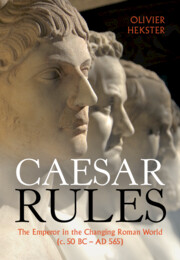
-
Select format
-
- Publisher:
- Cambridge University Press
- Publication date:
- 23 November 2022
- 08 December 2022
- ISBN:
- 9781009226776
- 9781009226790
- Dimensions:
- (244 x 170 mm)
- Weight & Pages:
- 0.92kg, 414 Pages
- Dimensions:
- Weight & Pages:
You may already have access via personal or institutional login
Book description
For centuries, Roman emperors ruled a vast empire. Yet, at least officially, the emperor did not exist. No one knew exactly what titles he possessed, how he could be portrayed, what exactly he had to do, or how the succession was organised. Everyone knew, however, that the emperor held ultimate power over the empire. There were also expectations about what he should do and be, although these varied throughout the empire and also evolved over time. How did these expectations develop and change? To what degree could an emperor deviate from prevailing norms? And what role did major developments in Roman society – such as the rise of Christianity or the choice of Constantinople as the new capital – play in the ways in which emperors could exercise their rule? This ambitious and engaging book describes the surprising stability of the Roman Empire over more than six centuries of history.
Reviews
‘Hekster's magisterial survey of Roman emperorship puts the subject on a new footing. Drawing on a wide range of literary, documentary, and visual evidence, it provides a rich and three-dimensional account of emperors in action and in the imagination. It will be of interest not only to Roman historians, but to all students of premodern rulership.'
Carlos Noreña - Associate Professor of Ancient History and Mediterranean Archaeology, University of California, Berkeley
‘The emperor was the single most unifying concept in the political imagination of a population of incredible cultural, ethnic and linguistic plurality. Furthermore, communicating the centrality of the emperor to this audience required being attentive to an historical landscape that changed dramatically over centuries. Hekster's new book approaches this important issue with intelligence and circumspection, noting the overdue need for a return to traditional political history, while engaging with the fruitful models of cultural and literary history. As a result, Caesar Rules is a sensitive study that will be of interest to historians, classicists and students of political science for many years to come.'
Shane Bjornlie - Professor of History, Claremont McKenna College
‘Pleasingly iconoclastic … this is not just another tired study of the gap between representation and reality in ancient rulership. Working pragmatically with a wide range of sources, Hekster demonstrates how consistent imperial roles and attributes remained over 600 years of Roman history, however variously they were inflected.’
Michael Kulikowski Source: Times Literary Supplement
‘… Hekster does an admirable job of covering a truly impressive range in almost every aspect of his subject matter, from the materials consulted to the topics considered. As this volume demonstrates, the most powerful office in the ancient world was also its most ambiguous, its holder capable of both appearing and behaving in utterly different ways to different constituencies at different moments in imperial history.’
Kevin Feeney Source: Bryn Mawr Classical Review
‘This excellent study of these ‘men for all seasons’ is highly recommendable! It offers a very beautiful synthesis of a changing world…’
Stéphane Benoist Source: Sehepunkte
‘An excellent book on a fascinating subject. … Recommended.’
M. W. Handis Source: CHOICE
‘The wealth of material that [the author] adduces throughout the book to argue his points allows readers to delve more deeply into images and debates, whilst also allowing them to keep the main goal of the emperor’s multiplicity in focus - no mean feat.’
Panayiotis Christoforou Source: Polis: The Journal for Ancient Greek and Roman Political Thought
Contents
Metrics
Altmetric attention score
Full text views
Full text views help Loading metrics...
Loading metrics...
* Views captured on Cambridge Core between #date#. This data will be updated every 24 hours.
Usage data cannot currently be displayed.
Accessibility standard: Unknown
Why this information is here
This section outlines the accessibility features of this content - including support for screen readers, full keyboard navigation and high-contrast display options. This may not be relevant for you.
Accessibility Information
Accessibility compliance for the PDF of this book is currently unknown and may be updated in the future.


